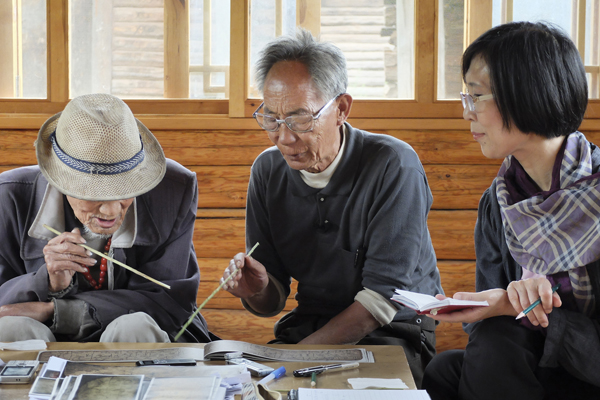Digital technology applied to save endangered culture
- By Wu Jin
 0 Comment(s)
0 Comment(s) Print
Print E-mail China.org.cn, September 26, 2014
E-mail China.org.cn, September 26, 2014
"Those were the stories I had heard only sporadically in conversation with others," one of the shamans said. He could have not imagined that he was able to prove its authenticity in his life time.
"The text behind the pictures of the Naxi manuscripts is very interesting. It is like a detective story, but you can't figure it out by yourself, you have to have the locals who know the texts in their heads," said Michael Oppitz, former director of the Museum of Ethnography at Zurich University, who proposed "A United Pool of Naxi Manuscripts" in 1999.
In his speech in the symposium, Oppitz emphasized, "Naxi pictographic writing has a fixed place in the history of writing systems for its ingenuity and extraordinary beauty. Just for that, saving this particular cultural heritage is very worthwhile."
With audio and video technologies, the Beijing ADCA filmed the whole process of the two respectful shamans deciphering the manuscripts that Zhang brought back from Britain.
But experts hope that more digital technologies would be applied to the preservation of endangered cultures to counteract the dominant erosion of sprawling modernity.
Interestingly, while it pushes aside and transforms ancient cultural heritage on the one hand, modernism can also play a supportive role in preserving dying traditions. Mobile apps, widget technology and Android systems -- the most avant-garde IT technologies -- will be applied to break into Dongba Culture. Manuscripts and rituals can be posted, downloaded and transmitted between mobile devices. A digital academic platform will also be built for scholars of Dongba Culture all around the world.
The projects are huge and will involve overseas museums, Naxi locals, scholars, tech groups and aficionados. Amazed at the magnificent digital preservation mission, the United Nations Educational Scientific and Cultural Organization (UNESCO) will appeal for the digitalized preservation of the culture.
"When you cannot stop (commercialism), all one can do is to save what is there. They [the manuscripts] have to be digitalized, brought together and be everywhere people can use them, especially the Naxi themselves," said Oppitz.







Go to Forum >>0 Comment(s)